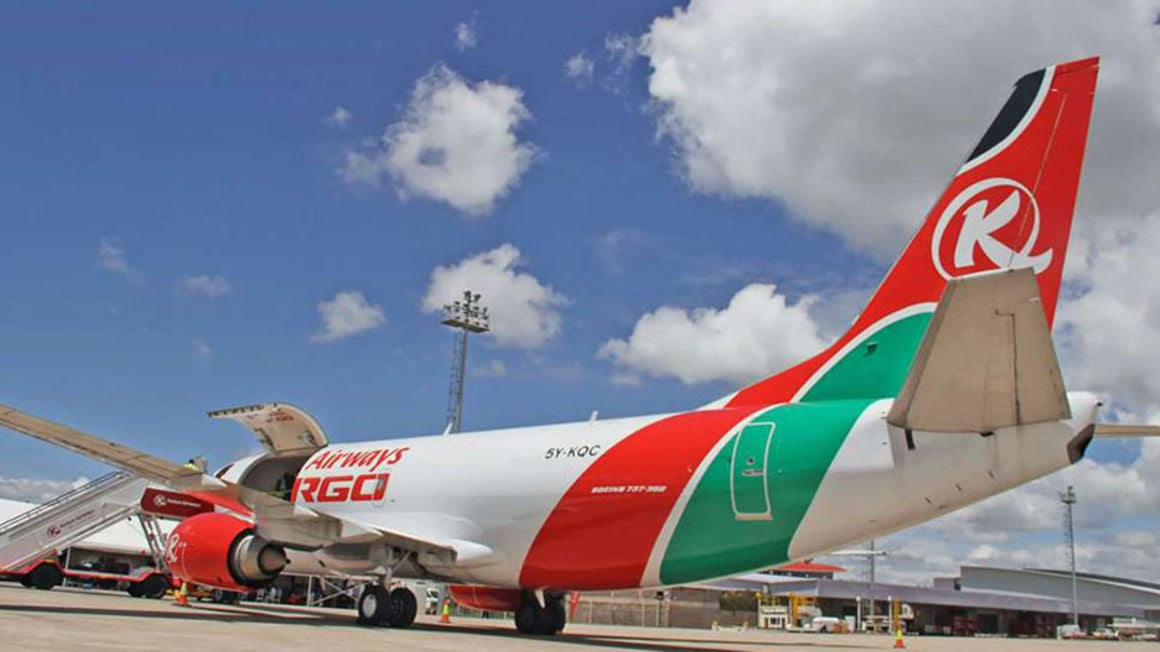
Kenya Airways Boeing 737-300 freighter jet. FILE PHOTO | NMG
Summary
- The national carrier has received permission to operate cargo from Johannesburg to Lusaka, Maputo, Harare, Lilongwe and Dar-es-Salaam.
- The nod gives KQ a green light to turn the two high capacity passenger aircraft into freighters to supplement the existing size for cargo in the wake of diminishing demand for flying.
- Covid-19 has affected demand for flying worldwide, forcing carriers to scale down on the number of flights operated in given routes.
Kenya Airways has started direct cargo flights between Johannesburg and other Southern Africa capitals as the carrier seeks to boost its revenue and capitalise on the absence of South African Airways to serve that market.
The national carrier has received permission to operate cargo from Johannesburg to Lusaka, Maputo, Harare, Lilongwe and Dar-es-Salaam.
This comes as a boost to the airline that is currently struggling with low passenger numbers caused by Covid-19. Passengers are core to KQ business.
This means that KQ will no longer have to fly back to Nairobi, as it has been the case, before in order to ferry the cargo to these countries.
“We are pleased to announce that starting this month, KQ cargo will now be operating directly from our directly from our Johannesburg hub to Maputo, Harare, Lusaka, Lilongwe, Lusaka and Dar-es-salaam,” said KQ.
“Previously, all traffic departing from Johannesburg had to pass through our Nairobi hub. With this new development, cargo from Africa’s largest manufacturing economy will now fly directly to these markets,” it added.
This implies that KQ has acquired the fifth freedom, an aviation parlance that means the airline has a right to fly from one foreign country to another without necessarily returning to its base.
The airline has previously announced that it wants to expand its cargo business to cater for at least 20 percent of the overall business and cut overreliance on passenger, which accounts to close to 90 percent of the total revenue.
The airline recently received approval to convert two of its Dreamliner into cargo aircraft from its lessors as it sought to increase its limited cargo capacity.
The nod gives KQ a green light to turn the two high capacity passenger aircraft into freighters to supplement the existing size for cargo in the wake of diminishing demand for flying.
Kenya Airways chief executive officer Allan Kilavuka said the airline is targeting to convert the two aircraft before the end of the year.
“So far, two lessors have indicated a no objection to the conversion of the B787 Dreamliner aircraft to freighters for a two year period,” said Mr Kilavuka.
“These two aircraft should be converted by the end of the year,” added the CEO in a previous interview with the Business Daily.
During the lockdown, the airline converted some of its Boeing 787 aircraft into freighters, however, they did not remove seats to accommodate more freight. The move could only see the carrier ferry close to 50 percent of goods.
KQ has two freighters at the moment but they cannot be used for long range such as connecting Africa to Europe because of the minimal distance that they can cover.
Scaling down
The national carrier plans to diversify 40 percent of its business to other revenue streams and cut overreliance on passenger services, which forms the bulk of its revenue.
Covid-19 has affected demand for flying worldwide, forcing carriers to scale down on the number of flights operated in given routes.
The carrier it is currently operating at 37 percent on its international route.
Cargo remains the most promising business for airlines across the world following the resumption of passenger services, which have remained low.
KQ is projecting $300 million in losses this year following the adverse effects that the Covid-19 has had on its business following the grounding of passenger services in March.
The airline’s quest to haul more cargo has been curtailed by lack of high capacity long range freighters to evacuate huge volumes of freight to Europe.





No comments :
Post a Comment